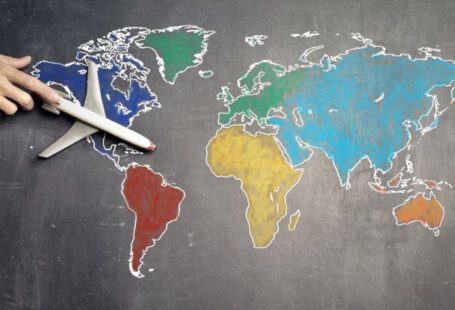In a rapidly changing world where cultural norms and traditions are constantly evolving, traditional festivals face the challenge of adapting to modern times while preserving their authenticity and significance. These age-old celebrations, deeply rooted in history and heritage, play a crucial role in connecting communities, passing down rituals, and celebrating shared values. Amidst the fast-paced advancements of the 21st century, how are traditional festivals navigating the delicate balance between tradition and innovation?
Preserving Cultural Roots
Traditional festivals serve as a lens through which we can glimpse into the rich tapestry of our cultural heritage. They encapsulate the essence of a community’s values, beliefs, and customs, acting as a time capsule that transports us to bygone eras. In the face of modernization, many traditional festivals have made a conscious effort to preserve their cultural roots by staying true to their origins. By maintaining the core elements that define these celebrations, organizers ensure that the essence and spirit of the festival remain intact.
However, preserving cultural roots does not equate to stagnation. Traditional festivals are dynamic entities that evolve with the times, incorporating contemporary elements while retaining their traditional essence. This delicate balance between old and new is essential for festivals to stay relevant and engaging in a rapidly changing world. By embracing innovation without compromising on tradition, these festivals can attract a wider audience and appeal to younger generations who may be less connected to their cultural heritage.
Incorporating Modern Elements
One of the ways traditional festivals are adapting to modern times is by incorporating modern elements into their celebrations. From integrating technology to introducing contemporary art installations, festivals are finding creative ways to appeal to a younger and more diverse audience. By blending traditional practices with modern twists, organizers can breathe new life into age-old traditions and make them more accessible and appealing to a modern audience.
For example, many traditional festivals now leverage social media platforms to promote their events, engage with attendees, and reach a wider audience beyond their local communities. By harnessing the power of digital marketing and online platforms, festivals can increase their visibility and attract a new generation of festival-goers who may have otherwise been unaware of these cultural celebrations.
Embracing Sustainability
In an era where environmental consciousness is on the rise, traditional festivals are also adapting to modern times by embracing sustainability practices. From reducing plastic waste to promoting eco-friendly initiatives, festivals are increasingly mindful of their environmental impact and are taking steps to minimize their carbon footprint. By incorporating sustainable practices into their planning and execution, festivals can not only reduce their environmental impact but also set an example for other events to follow.
For instance, many festivals now prioritize using biodegradable materials, implementing recycling programs, and promoting eco-friendly transportation options to reduce the festival’s overall environmental footprint. By aligning their celebrations with sustainable practices, traditional festivals can appeal to a more environmentally conscious audience and demonstrate their commitment to preserving not just cultural heritage, but also the planet for future generations.
Fostering Community Engagement
Traditional festivals have always been a cornerstone of community life, bringing people together to celebrate shared traditions and values. In modern times, festivals are leveraging technology and social media to foster community engagement and create a sense of belonging among attendees. By creating interactive experiences, organizing workshops, and encouraging participation, festivals can strengthen community bonds and create lasting memories for participants.
For example, many festivals now offer interactive activities such as workshops, cultural performances, and hands-on experiences that allow attendees to actively engage with the traditions and customs being celebrated. By providing opportunities for hands-on participation, festivals can create a sense of ownership and pride among attendees, fostering a deeper connection to the cultural heritage being showcased.
Embracing Diversity and Inclusivity
As societies become increasingly diverse and multicultural, traditional festivals are adapting to modern times by embracing inclusivity and diversity. Many festivals now feature programming that highlights a wide range of cultural traditions, inviting attendees from different backgrounds to come together and celebrate their shared humanity. By promoting inclusivity and diversity, festivals can create a welcoming and inclusive space for all attendees, regardless of their cultural or ethnic background.
For example, festivals often feature performances, exhibitions, and activities that showcase a diverse range of cultural traditions and practices, allowing attendees to learn about and appreciate different cultures. By celebrating diversity and promoting cross-cultural exchange, festivals can foster understanding, respect, and unity among attendees, transcending barriers and fostering a sense of global citizenship.
Promoting Cultural Exchange
Traditional festivals are also adapting to modern times by promoting cultural exchange and dialogue between different communities. In an increasingly interconnected world, festivals serve as platforms for cultural diplomacy, allowing for the exchange of ideas, traditions, and experiences between people from diverse backgrounds. By fostering cross-cultural dialogue and understanding, festivals can bridge divides, promote peace, and celebrate the universal values that bind us together as a global community.
For example, many festivals now feature international performers, artists, and cultural showcases that highlight the diversity and richness of global heritage. By promoting cultural exchange and dialogue, festivals can break down stereotypes, challenge prejudices, and build bridges between communities, fostering a spirit of unity and cooperation that transcends borders and boundaries.
Conclusion: Evolution in Tradition
Traditional festivals are not relics of the past but living, breathing entities that continue to evolve and adapt to the changing times. By preserving their cultural roots, incorporating modern elements, embracing sustainability, fostering community engagement, promoting diversity and inclusivity, and facilitating cultural exchange, festivals are ensuring their relevance and significance in a rapidly changing world. As we navigate the complexities of the modern era, traditional festivals serve as beacons of tradition, resilience, and unity, reminding us of the enduring power of culture to connect, inspire, and enrich our lives.





